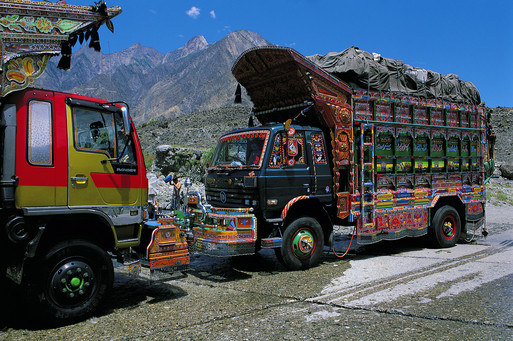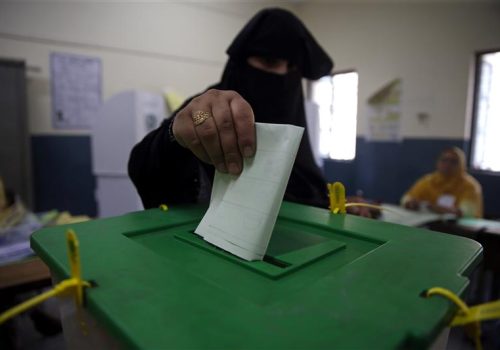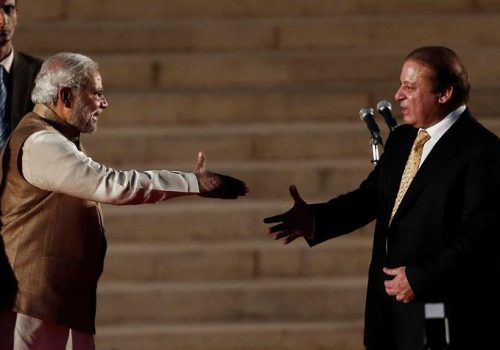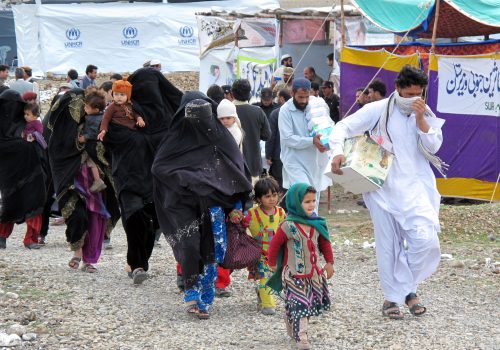As it celebrates seventy-five years of independence, Pakistan today “requires a change in political thinking across the political class,” especially if the country is to chart a better future towards a hundred years of independence, says historian and author Dr. Ilhan Niaz. The alternative, he warns, may result in the “liquidation of the country” from which the elite political class draws their resources and identity.
Dr. Ilhan Niaz, chair of the history department at Quaid-i-Azam University and author of The State During the British Raj: Imperial Governance in South Asia 1700-1947 has extensive experience studying the long history of South Asia and the legacy of the British Raj on the Indian subcontinent.
In this interview with Uzair Younus, Director of the South Asia Center’s Pakistan Initiative, Niaz discusses the role of the political class and Pakistan’s long historical trajectory into what he denotes a “decaying orbit.” He showcases that the crisis in Pakistan is fundamentally a crisis of identity—in terms of modernity versus Islam and democracy versus authoritarianism.
Here are some key takeaways from the interview:
The struggle between modernity and religion
- According to Niaz, the struggle for Pakistan and the creation of a separate Muslim homeland is rooted in a modernist discourse that argued Muslims failed to keep up with the knowledge, science, military arts, and the ideological and political developments that had swept through the western world.
- However, after independence, he notes, the struggle for “Muslim modernism” as an approach to governance and organizing society withered away at an intellectual, administrative, social, and economic level.
- As such, Niaz argues that the history of Pakistan since 1947 is “an amalgam of a kind of regression towards primordial identities” that attempts to pack together elements of modernity in a religious discourse. Ultimately, “this crisis of our world view,” he notes, is the source of many of Pakistan’s problems since 1947.
Pakistan’s great tragedy
- Throughout Pakistan’s history there have been many key inflection points that shaped its trajectory. According to Niaz, this led Pakistan to a situation where even though Pakistani leaders have been well advised by their advisors or civil servants, the short-term goals of the political class—which consists of politicians, judges, military officers, and bureaucrats—have led to “unwise decisions” that continue to overshadow and overpower decisions that would have been better for the country in the long-term.
- Ultimately, he argues, this is “Pakistan’s great tragedy.” The current trajectory was avoidable, especially considering that countries which started off in a worse position than Pakistan—and “inherited far worse from their colonial masters”—have done much better.
Military bureaucracy: A legacy of British colonial rule
- The dominance of military elites in Pakistan did not start with colonial rule, but rather goes back to the Mughal empire and other smaller and less successful kingdoms. However, Pakistan did disproportionately inherit a large military class from the British.
- This military class in Punjab and partly in Khyber Pakhtunkhwa, Niaz adds, remains a “very strong source of support not only for military rule, but also for other types of authoritarian tendencies and experiments” that civilian leaders have opted for from time to time. In this regard, he argues that while the “authoritarian constituency” as a social group was something Pakistan inherited from the British, authoritarian tendencies in the region go back hundreds of years.
The situation today is as grim as it seems
- While elite Pakistanis would like to believe that the country’s current situation is not as bad as it seems, that Pakistan has survived much worse, and that it will come out “alright” on the other side, Niaz showcases that this view is highly limited and flawed.
- He argues that Pakistan survived Partition, the mass migration, and war with India over Kashmir because those crises were met with effective responses. The idea that Pakistan was “alright” after the 1971 crisis with East Pakistan is simply unimaginable. The impact of that loss left a chronic set of political, economic, and administrative problems that Pakistan continues to tackle to today.
- Ultimately it is essential to realize that while there is no doubt Pakistan deserves credit for having staggered through seventy-five years, “Pakistan is running out of countries to fall behind,” says Niaz.
Jinnah’s vision for Pakistan’s governance structure
- Muhammad Ali Jinnah, Pakistan’s founder and first governor-general, envisioned Pakistan as a parliamentary democracy with a relatively strong central government that would implement reforms necessary to modernize the country.
- Pakistan, Niaz adds, has “paid an enormous price” for its continued attempts to tamper with the basic understanding of a parliamentary democracy. He argues that this debate surrounding Pakistan’s governance structure has produced a “very toxic political competition” where political elites spend the majority of their time with “unconstructive political conflicts” while the rest of the population, and their needs, remain neglected.
Silver linings and hope for the future
- Looking back on the past seventy-five years, one source of pride and inspiration is Pakistan becoming a nuclear power. According to Niaz, the nuclear program gave Pakistan “a strategic weight” which continues to go well beyond what the country’s economic indicators otherwise merit.
- Regarding hope for the future, he contends that it lies with the youth. Whether it is the athletes that succeed without any government support or students in universities, the youth of Pakistan is no longer waiting for the government’s support to make things better in the country. And, this desire of the people is perhaps why Pakistan continues to function and, to some extent, have any social and economic stability.
Watch the full interview below:

The South Asia Center is the hub for the Atlantic Council’s analysis of the political, social, geographical, and cultural diversity of the region. At the intersection of South Asia and its geopolitics, SAC cultivates dialogue to shape policy and forge ties between the region and the global community.



